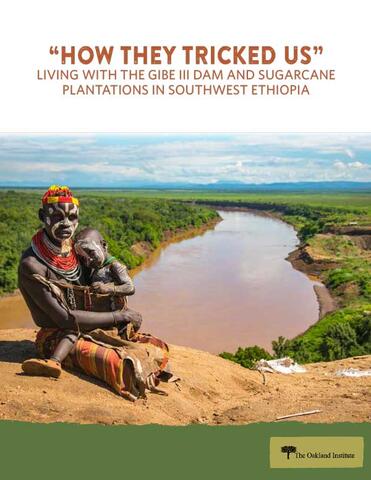Ethiopia’s Indigenous Face Acute Hunger, Displacement by Dam and Sugarcane Plantations

---FOR IMMEDIATE RELEASE---
June 10, 2019
Contact:
Anuradha Mittal
[email protected]
+1-510-469-5228
-
New field research documents displacement, acute hunger, and increased violent conflict in Ethiopia’s Lower Omo Valley
-
The cost of the Gibe III Dam and sugarcane plantations — a part of Ethiopia’s ambition to become a leading sugar producer — has been borne by the Indigenous.
-
Despite sweeping political change over the last one year in the country, the impact of past “development” projects and resulting suffering of Indigenous communities remains unaddressed by the new administration.
Oakland, CA — In a new report, How They Tricked Us: Living with the Gibe III Dam and Sugarcane Plantations in Southwest Ethiopia, the Oakland Institute reveals the dire situation faced by the Indigenous in Ethiopia's Lower Omo Valley and calls for urgent action by the government.
For years, the Oakland Institute has raised alarm about the threats that the Gibe III Dam and sugarcane plantations pose to the local population in the region. Now, several years on, new field research reveals the true impact on the Indigenous communities, who have called the area home for centuries.

“Over the past year, the country, now led by Prime Minister Dr. Abiy Ahmed, has gone through tremendous changes starting with the release of thousands of political prisoners, including Indigenous leaders and activists,” said Anuradha Mittal, Executive Director of the Oakland Institute. “Change, however, has not reached the Bodi, Mursi, and Kwegu communities of Lower Omo — many who were forcibly evicted under the previous regime to make way for the construction of the Gibe III Dam and sugarcane plantations — and today face loss of livelihoods, starvation, and violent conflict,” she continued.
How They Tricked Us details the impact of these projects on local communities, including the loss of essential farmland and grazing land. Acute hunger is now common with the dam's blockage of the annual flood — a natural event that the inhabitants of the valley have relied on for centuries for cultivation. Communities allege being tricked into leaving their ancestral land by the government's false assurances of a controlled flood to compensate for the loss, which has not happened.
People were pressured to give up pastoralism and adopt sedentary lifestyles. However, resettlement sites offered to communities are riddled with failed promises and abuse. Plots are not big enough to feed families, ripened crops have been ploughed over, communities have been forced to dig their own irrigation canals under perilous conditions, and promised key services — schooling, health care, grinding mills, food aid, and electricity — have either failed to materialize or been woefully inadequate. Local violence — including a rash of vehicle incidents near plantations that local communities believe to be intentional — is also reportedly on the rise.
The government's focus on dam and large-scale plantations has brought misery to local communities in Lower Omo. This top-down development approach decided hundreds of miles away overlooked the needs and the views of the locals, including development plans they had themselves designed and called for, such as the Mursi-Bodi Community Conservation Area.
“Addressing past abuses is essential to usher in a new era of inclusive development — one that benefits and values Indigenous communities, their traditions, cultures, and livelihoods. The Prime Minister's reform agenda emphasizes human rights and medemer - an Amharic word for coming together and synergy. After years of broken promises and widespread abuse, a development strategy in the Lower Omo based on respect and protection of Indigenous rights is the way forward,” concluded Mittal.
###
